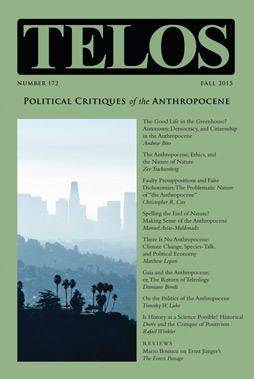Telos 172 (Fall 2015) is now available for purchase in our store.
 Rapid climate change today is attributed to the profligate use of fossil fuels, and this consumption of hydrocarbon energy has worldwide, albeit uneven and discontinuous, cultural and economic patterns to it. Nonetheless, it is more than plausible to spin up the frameworks for a universal history of humanity based upon modern society’s increasing combustion of the planet’s biotic prehistory as fossil fuel energy. As the carbon of antediluvian plant matter is burned to light homes, run factories, and propel vehicles, the history of the present becomes materially universalized as the exhausted energy of the distant past released along with its soot, smog, and smoke.
Rapid climate change today is attributed to the profligate use of fossil fuels, and this consumption of hydrocarbon energy has worldwide, albeit uneven and discontinuous, cultural and economic patterns to it. Nonetheless, it is more than plausible to spin up the frameworks for a universal history of humanity based upon modern society’s increasing combustion of the planet’s biotic prehistory as fossil fuel energy. As the carbon of antediluvian plant matter is burned to light homes, run factories, and propel vehicles, the history of the present becomes materially universalized as the exhausted energy of the distant past released along with its soot, smog, and smoke.
Thus, noxious by-products of production and consumption ironically become the crown of commodified creation at the end of history, whose ultimate historical ends, as Fukuyama reaffirms, are tied to the “endless accumulation” of wealth. Little did he know, this outcome also would entail nonstop increases in greenhouse gases and rapid climate change; but, environmentalists, historians, sociologists, and technologists are more than willing now to seize upon this curious outcome for the crisis narratives of a universal history framed by the concept of “the Anthropocene.”


